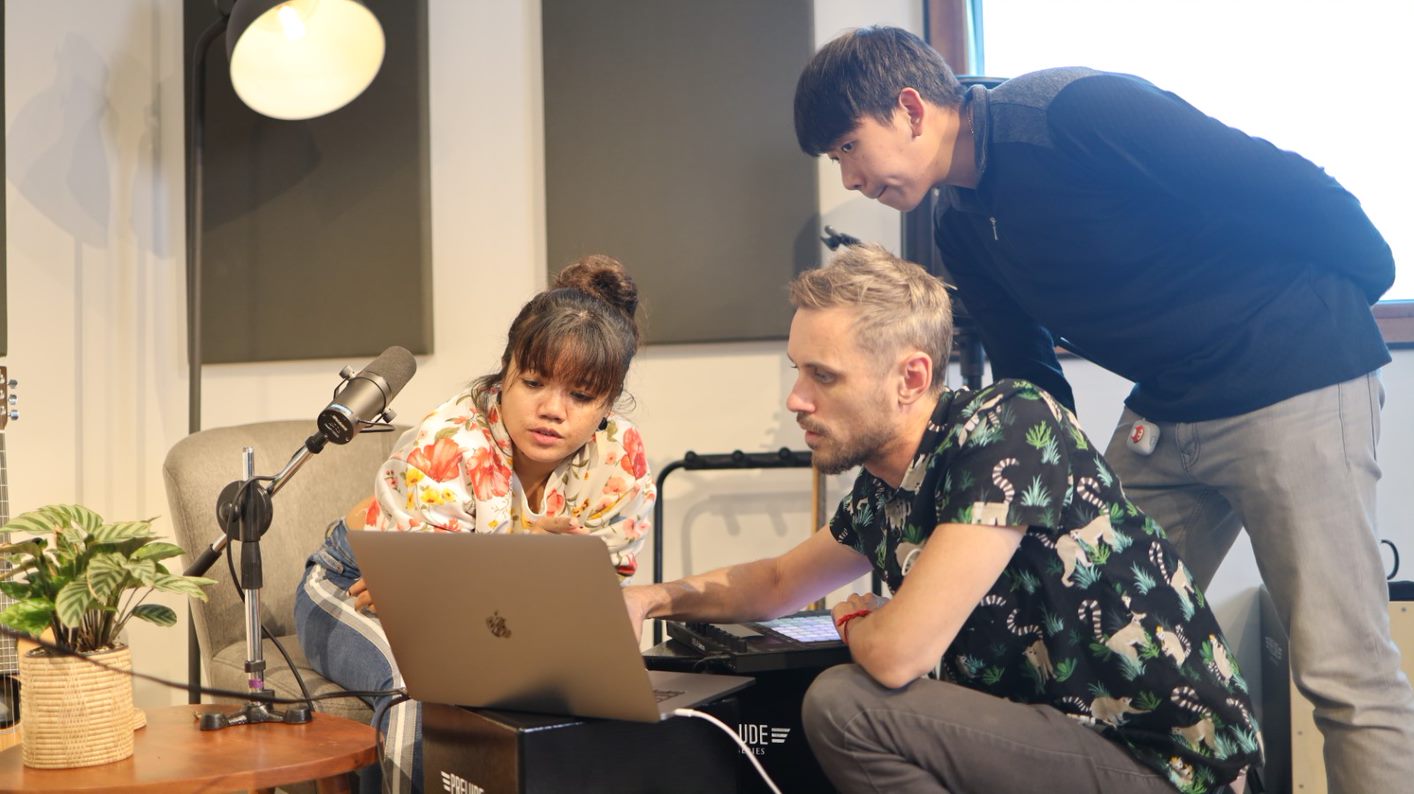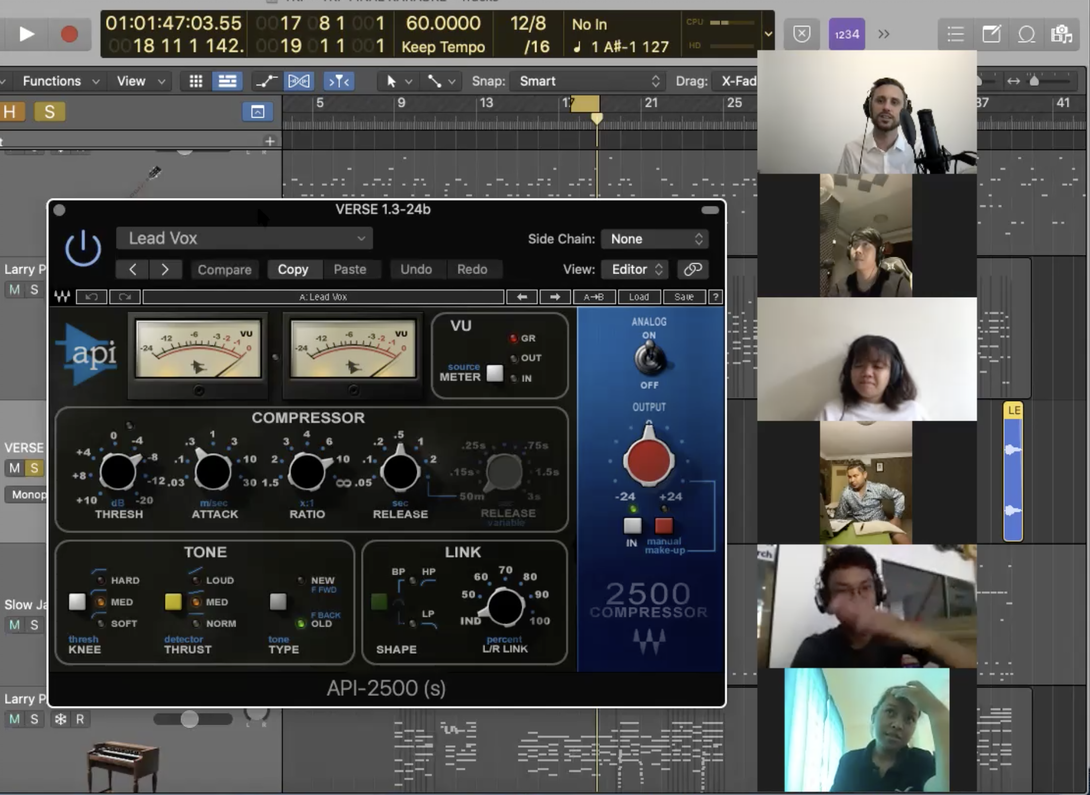Let us know what type of content you'd like to see more of. Fill out our three question survey.
Digital Asia Accelerator Cultivates Digital Skills for Cambodia’s Creative Sector
Aug 2, 2021
Widespread digitalization has revolutionized almost every industry, including music and sound production. While rarely the focus of digital development initiatives, creative entrepreneurs such as artists and musicians in emerging economies have also found themselves scrambling to adapt to the ever-changing technology and social media landscapes. As such, this year, with funding from the U.S. Agency for International Development (USAID)’s Digital Asia Accelerator (DAA) initiative and as a part of the Digital Connectivity and Cybersecurity Partnership, The Sound Initiative (TSI)—a vocational program for musicians—launched the “Music 4.0” program to support Cambodian entrepreneurs striving to excel in this dynamic industry.

Source: TSI.
“Music is one of the most easily accessible and consumable pieces of art,” wrote TSI’s Irene Hang in a recent post. “More and more, talented young Khmer artists are beginning to emerge from the shadows and are setting new records every single day,” Hang said. “Cambodians, much like everyone else in the world, consume their music via digital streaming platforms. Whether it’s YouTube, Spotify, or local streaming platforms, everyone is using digital platforms every single day. Artists already know how to make great quality music and visuals, but the problem lies in how well they can actually reach a new audience pool and distribute their work successfully and safely,” Hang explained.
How Music 4.0 Helps Expand Reach
To address this problem, the Music 4.0 program delivers tailored opportunities for artists and producers to build digital literacy skills as they pertain to the business of music production and promotion. One of the key goals of DAA, from which TSI receives grant funding, is to improve the digital skills of businesses in developing economies. DAA recognizes that for artists and entrepreneurs to produce and sell their services in today’s world—especially post COVID-19—digital savvy is not just an asset but a necessity. A lack of digital skills prevents businesses of all shapes and sizes from taking full advantage of the opportunities enabled by the digital economy. The Accelerator supports training modules and programs for various industry associations to train small and medium enterprises (SMEs) across Southeast Asia. As a part of this innovative pilot program, DAA is working specifically with TSI to pilot this digital skills program with Cambodian creative entrepreneurs while capitalizing on opportunities to expand DAA’s work with similar SMEs regionally.
Music 4.0, a fully localized training program delivered in Khmer and designed for e-learning, is intended for creative entrepreneurs who already excel in their musicality but would like to bolster their musical products’ sound quality, promotional skills, and business success. Music 4.0 focuses on building digital skills such as advanced mixing, mastering, branding, marketing, distribution, business, and communication.
Music 4.0’s First Term & the Impact of COVID-19
For its first term, TSI initially envisioned providing instruction for six students in the TSI music studio while simultaneously shooting high-quality video to develop future online learning content. But, as it did for so many, COVID-19 derailed TSI’s plans. “Many creative freelancers and others working in the arts and entertainment sectors already face significant challenges in finding work, and COVID-19 and the recent lockdowns have only exacerbated this,” TSI reported.
TSI had to shift its in-person lessons to an online format quickly. “This change challenged our curriculum, as it was designed to utilize the studio space, equipment, and physical collaboration,” TSI stated. The Music 4.0 program first attempted to deliver the content—designed explicitly for in-studio classes—via digital platforms and with digital tools instead. It found that challenges with internet bandwidth and student access to equipment made certain classes ineffective and thus adapted further by modifying course modules to focus on topics that are easier to teach online.

Source: TSI.
“Due to COVID-19 and lockdowns in Phnom Penh, creating online learning content at home with limited equipment and staff capacity to manage this has resulted in slower progress than anticipated,” explained TSI staff. “Nonetheless, the first term has seen progress. Student feedback has been positive, reporting increased self-confidence and soft skills in collaboration,” TSI said.
“Joining the program opened my eyes to what defines an artist, what part of the songwriting needs attention, the genre, how to build your brand and to market your music,” shared participant Phalla “Sai” Thoun. Before the Music 4.0 classes, all participants reported that they didn’t know how to develop their unique artistic brands. After the lessons, however, “all trainees reported a deeper awareness of how to think about their brand, presenting that online and how to position themselves in digital media using tools, specifically those related to creating visual content,” said TSI.
Advantages and Opportunities of TSI’s Online Learning Content
The six musicians selected for term one have still been able to reap benefits from the training and mentorship offered in the online context. “The online learning content is being designed and developed simultaneously and tested,” TSI said. The participating musicians also provide regular feedback on the online learning content development, helping hone the model for future iterations and public release.
“This online platform allows students to be more involved with the lesson even if they cannot be present in the same room,” said Hang. “By using it, they are getting more comfortable with this new way of learning, and it encourages them to be as authentic as possible in the digital realm. It is not just our students who can benefit from this online learning platform. After it is publicly released, anyone can enroll in the program with just a device that has an internet connection.”
Source: TSI.
Music 4.0 will be made available to the general public later this year and will include access to video tutorials, masterclass videos with celebrities and industry experts, downloadable tools, quizzes, and other innovative features. Based on the demand in Cambodia for mobile-first content, TSI has built the program to run solely from mobile phones versus computers. To keep an eye out for Music 4.0’s release and to learn more about TSI, follow its social media or sign up for its newsletter. To learn more about the Digital Connectivity and Cybersecurity Partnership and other related programming, follow this link.
The Digital Accelerator Asia is funded by USAID Asia and is part of Digital Frontiers, a buy-in mechanism available to USAID Bureaus and Missions. DAI implements Digital Frontiers, which works closely with USAID Missions and Bureaus, the private sector, and international and local development organizations to identify successful and sustainable digital development approaches and scale their impact globally.